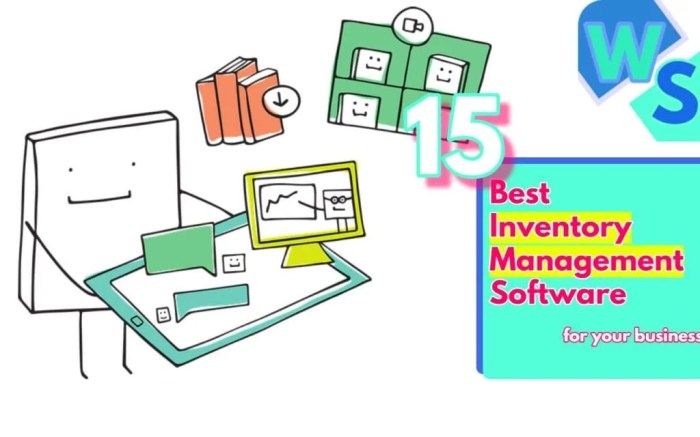Inventory management software for business is crucial for optimizing stock levels, reducing waste, and improving overall efficiency. It helps businesses track inventory movements, forecast demand, and automate tasks, ultimately leading to significant cost savings and increased profitability.
This software offers a comprehensive solution for businesses of all sizes, from small startups to large corporations. It provides real-time visibility into inventory levels, allowing businesses to proactively address potential shortages or surpluses. The software also facilitates better communication and collaboration between different departments, streamlining workflows and improving overall productivity.
Effective inventory management is crucial for any business, regardless of size. Properly tracking and managing inventory can significantly impact profitability, efficiency, and customer satisfaction. Inventory management software offers a powerful solution for streamlining these processes. This comprehensive guide delves into the world of inventory management software, exploring its benefits, features, and how to choose the right system for your needs.
Understanding the Importance of Inventory Management
Effective inventory management goes beyond simply keeping track of stock. It involves optimizing stock levels, predicting demand, minimizing storage costs, and ensuring timely order fulfillment. Poor inventory management can lead to significant issues, including:
- Stockouts: Losing sales due to insufficient stock.
- Excess inventory: Tie-up of capital in unsold goods, leading to storage costs and potential obsolescence.
- Increased operational costs: Inefficient processes and manual errors.
- Customer dissatisfaction: Delays in order fulfillment and inaccurate order information.
Inventory Management Software: A Detailed Overview
Inventory management software (IMS) provides a centralized system for tracking inventory levels, orders, suppliers, and customers. This allows businesses to gain a real-time view of their stock, optimize their operations, and make informed decisions.
Key Features of Inventory Management Software, Inventory management software for business
- Real-time Inventory Tracking: Accurately reflecting inventory levels across all locations.
- Order Management: Streamlining order processing, from receiving orders to shipping.
- Supplier Management: Managing supplier relationships, tracking orders, and negotiating contracts.
- Demand Forecasting: Predicting future demand to optimize stock levels.
- Reporting and Analytics: Providing insightful reports on inventory performance, sales trends, and profitability.
- Integration with other business systems: Connecting with accounting software, e-commerce platforms, and point-of-sale (POS) systems.
Types of Inventory Management Software
Different types of inventory management software cater to diverse business needs. Some popular options include cloud-based, on-premise, and open-source solutions. Cloud-based options are often more accessible and scalable, while on-premise solutions offer greater control. Open-source options provide customization options but might require more technical expertise.
Choosing the Right Inventory Management Software
Selecting the right inventory management software requires careful consideration of your business needs and budget. Factors to consider include:

Source: founderjar.com
- Scalability: Can the software grow with your business?
- Integration capabilities: Does it integrate with your existing systems?
- Ease of use: Is the software user-friendly for your team?
- Cost: Is the software affordable within your budget?
- Customer support: What level of support is available?
Benefits of Using Inventory Management Software: Inventory Management Software For Business
Implementing inventory management software offers a range of benefits, including:
- Increased Efficiency: Streamlining processes and reducing manual errors.
- Improved Accuracy: Real-time tracking minimizes inaccuracies in inventory levels.
- Reduced Costs: Minimizing stockouts and excess inventory.
- Enhanced Decision Making: Providing data-driven insights into inventory performance.
- Better Customer Service: Ensuring timely order fulfillment and accurate order information.
FAQ
- Q: What is the difference between cloud-based and on-premise inventory management software?
A: Cloud-based software is hosted on the provider’s servers, while on-premise software is installed on your own servers. Cloud-based options offer scalability and accessibility but require an internet connection. On-premise options offer greater control but involve higher upfront costs and IT maintenance.
- Q: How much does inventory management software cost?
A: Pricing varies greatly depending on the software’s features, the number of users, and the level of support. It’s essential to get quotes from various vendors and compare their offerings.
- Q: What are some popular inventory management software providers?
A: Popular providers include (example names): Zoho Inventory, Fishbowl Inventory, and others. Researching reviews and comparing features is crucial.
Conclusion
Implementing inventory management software is a strategic investment that can significantly enhance your business operations. By streamlining processes, improving accuracy, and reducing costs, inventory management software empowers businesses to make data-driven decisions, optimize resources, and ultimately, achieve greater profitability. Choosing the right software for your needs is critical, and thorough research and consideration of your business requirements will lead to a successful implementation.

Source: winsavvy.com
Call to Action
Ready to take control of your inventory? Explore our recommended inventory management software solutions and discover how they can transform your business. Click here to learn more and request a demo.
In conclusion, implementing inventory management software for business is a strategic investment that can yield substantial returns. By automating processes, enhancing visibility, and improving forecasting accuracy, businesses can optimize their inventory management, boost profitability, and gain a competitive edge in the market. The future of efficient inventory management relies heavily on utilizing the right software.
FAQ Summary
How much does inventory management software typically cost?
Pricing varies significantly based on features, functionalities, and the size of the business. Some options are subscription-based, while others offer a one-time purchase. It’s essential to evaluate the needs of your business and compare different software packages before making a decision.
Can inventory management software integrate with other business systems?
Yes, many inventory management software solutions are designed to integrate with other crucial business systems, such as accounting software, point-of-sale (POS) systems, and customer relationship management (CRM) platforms. This integration streamlines data flow and improves overall business operations.
What are the benefits of using real-time inventory tracking?
Real-time inventory tracking enables businesses to make informed decisions about stock replenishment and allocation. It also helps identify potential issues early on, such as slow-moving items or obsolete stock, enabling proactive adjustments to prevent losses and maintain optimal stock levels.